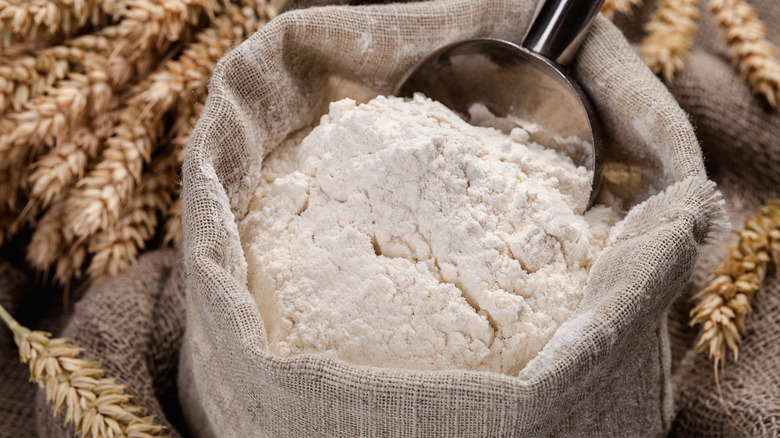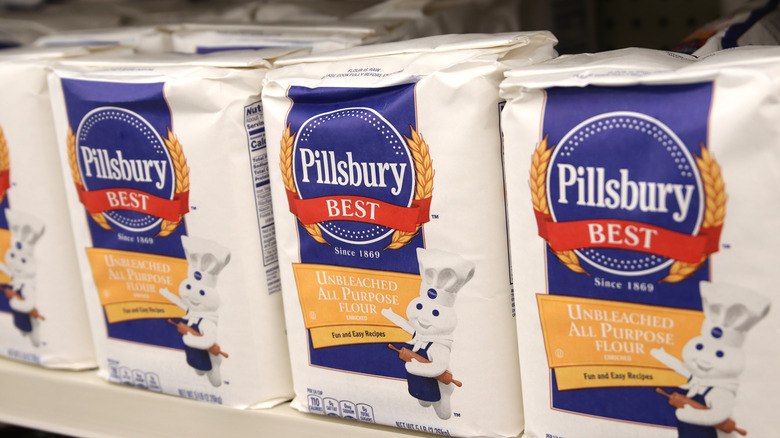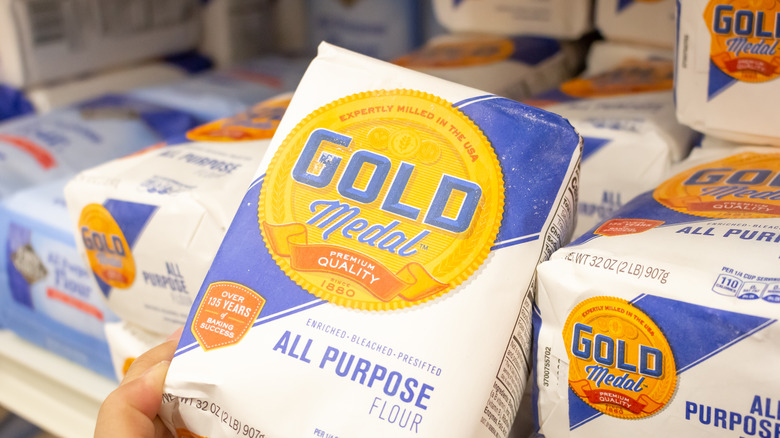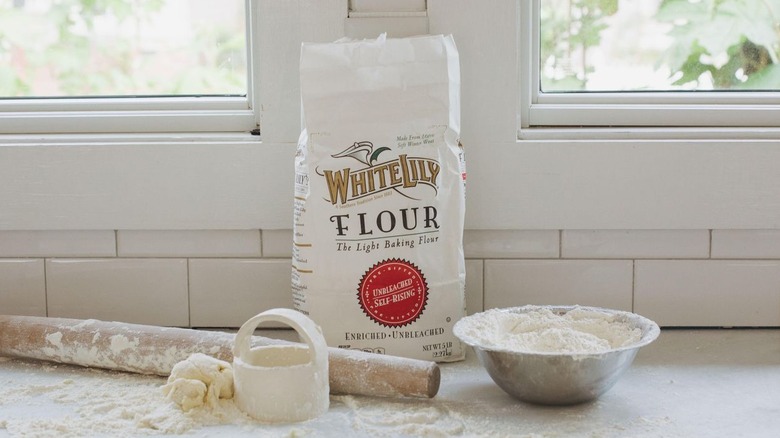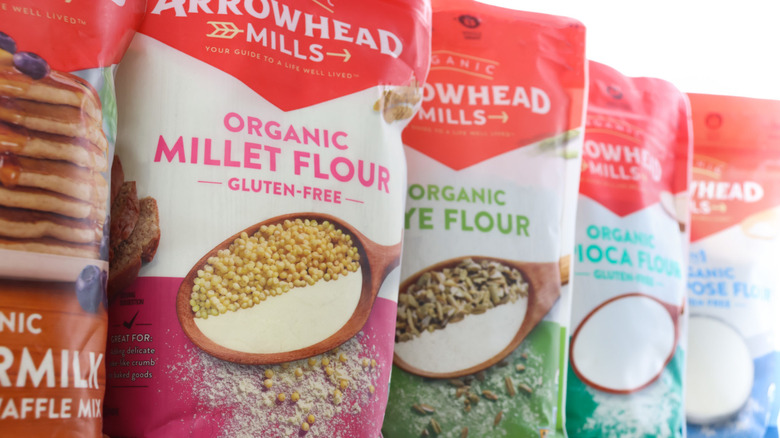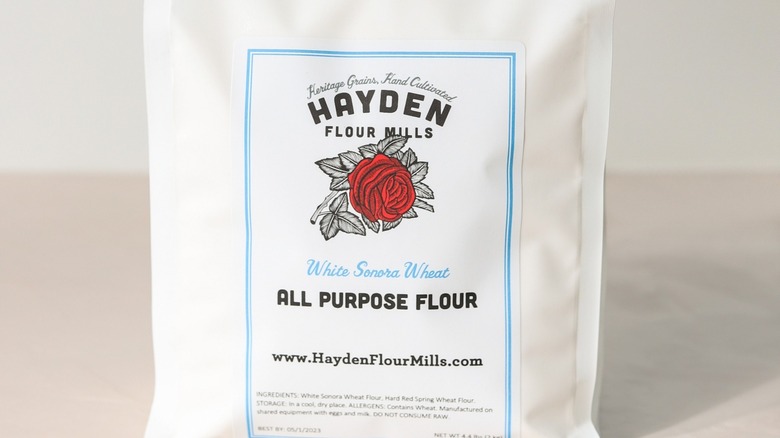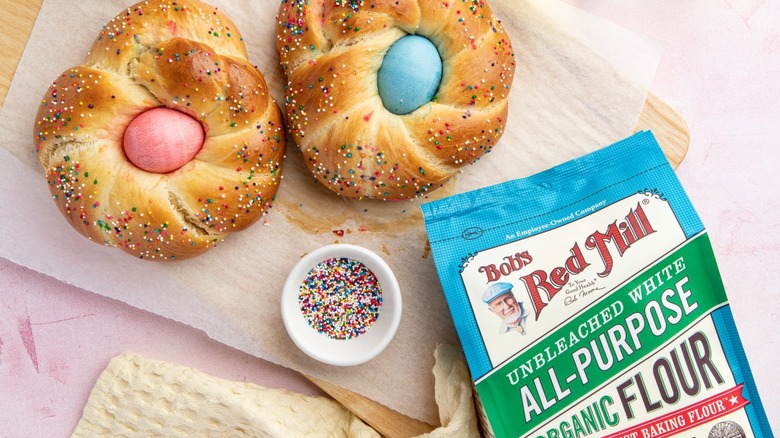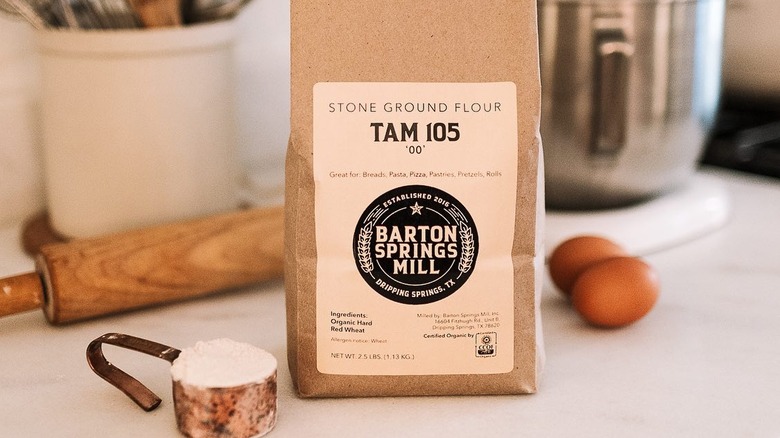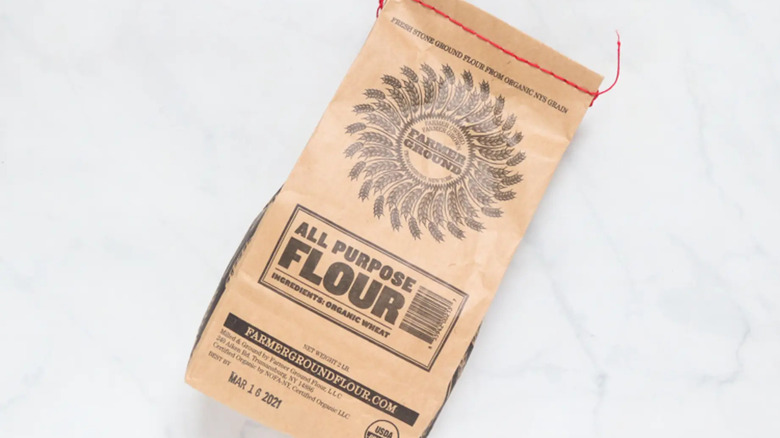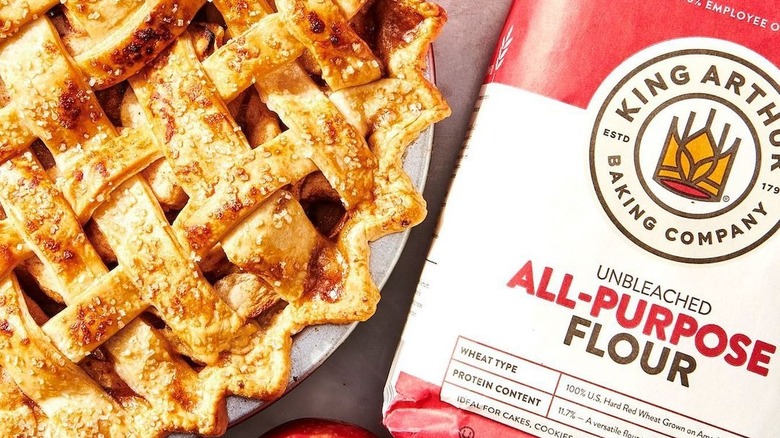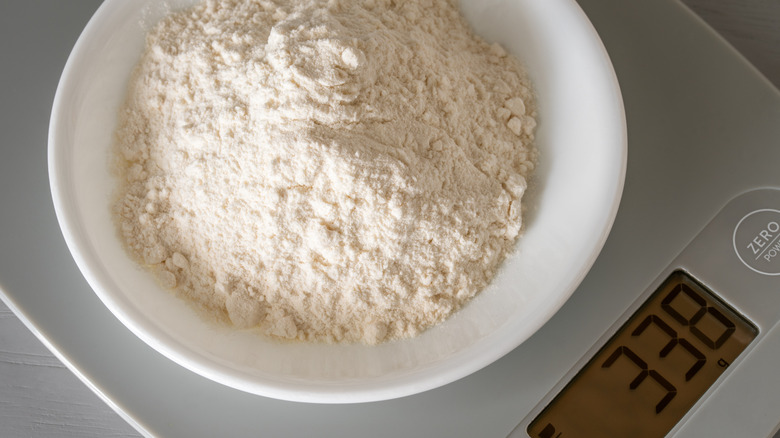9 Popular Flour Brands Ranked Worst To Best
When you walk down the baking aisle at the grocery store, you'll find more than a few bags labeled flour. All purpose flour, bread flour, cake flour, and more — all for different types of baking! With rising grocery prices, which brands are worth the price tag? We'll mainly be talking about all purpose flour today, for general usage in all baking applications. The main differences between flour brands is the type of wheats used in the commercial milling process.
Generally, flours vary based on their protein content. Cake flour, for example, has a lower protein percentage while bread flour has a higher percentage, ideal for those times when you want to make a perfect red velvet cake. All purpose flour falls in between, at about 11% total protein, making it ideal for baking cookies and saving some room in your cupboard. That said, all of the flours we've included in our roundup fall within this "all purpose" range. Note that all flours are slightly different, even if they say all purpose. Below are some of our favorite all purpose flours, from worst to best.
9. Pillsbury
Pillsbury brand is one of the most recognizable flour brands to most Americans. Starting with a few flour mills, Pillsbury's humble beginnings started in 1869 along the banks of the Mississippi River. After several years of success, Pillsbury began offering premade refrigerated doughs, which surged in popularity more than the namesake flour it was made with, and the popularity has continued ever since.
As inflation grows over the years, forcing many companies to reel in their budgets, some products have taken a noticeable downwards turn in quality. Pillsbury is no exception, and unfortunately, its flour is our least favorite to work with. When it comes to all purpose baking, Pillsbury's lower protein content often leads to dough that are much too wet or weak, even when you've followed your recipe perfectly. Behaving more like a cake flour than all purpose, this flour could potentially be great for making light cakes or breading protein, but in our kitchen, we'll mostly be avoiding it. One saving grace, if there is any, is that this flour is affordably priced, perfect for easy, on-the-go pancakes.
8. Gold Medal
Gold Medal is another ubiquitous flour brand that you usually see on the shelf right next to Pillsbury's. Slightly more expensive than Pillsbury with more product variety, Gold Medal generally performs a bit better than Pillsbury and is the most widely used flour in the U.S. With more than 140 years in the flour business, we will admit that Gold Medal is our go-to "lower end" brand. Furthermore, Gold Medal offers an organic all purpose flour, making it one of the more affordable flours on the market.
Gold Medal flour has around 10.5% total protein, using a blend of soft and hard wheats in the milling process. This makes it ideal for daily use, and if we're ever at a store that doesn't offer one of the higher ranked flours on this list, we would absolutely choose it. This flour would perform well in cake baking, as well as in any other delicate pastry recipes where you don't need a lot of strength or gluten.
7. White Lily
White Lily is a beloved Southern flour brand, dating back to 1883 where it began in Knoxville, Tennessee. Made with 100% soft red winter wheat, White Lily is known for its fine texture and low protein content, which results in a nice, pillow-like texture, perfect for a variety of Southern specialties. It's no wonder that White Lily has a cult following and is known in the industry as the best flour for biscuits.
While White Lily flour isn't truly "all purpose," we still highly recommend it because White Lily is going to help you make the best buttermilk biscuit or scone you've ever had. Keep in mind with a lower protein percentage, this flour isn't ideal for bread baking. When shopping for this brand, make sure to read the label closely and do not accidentally purchase its very popular self-rising product, which has baking powder and salt in the mix.
6. Arrowhead Mills
The Arrowhead Mills brand has been in business since the 1960s, representing one of the younger flour companies in our roundup, and the only one that is fully organic. According to their brand story, founder Frank Ford began milling organic flours on a stone mill and delivering them to customers in the back of his pickup truck in Texas. With a wide product range of USDA certified organic flours, gluten free flours, oats, cereals, and more, Arrowhead mills a lot of products. Their consistency and commitment to quality stands out, separating them from brands like Gold Medal and Pillsbury.
When you use a flour like Arrowhead Mills versus Pillsbury, you can immediately tell the difference thanks to higher protein content. This means more strength, more lift, and slightly more gluten, which we like about this flour. We also like that there's no confusion on what's being offered — almost every product from Arrowhead Mills is organic. We appreciated the higher quality for a bit higher of a price point. While this flour falls in the lower middle range of our ranking, we really enjoy working with it when we want a premium, organic all purpose flour.
5. Hayden Flour Mills
Hayden Flour Mills products are some of the highest quality on the market, which makes sense considering their price point is on the higher end for a pound of flour. They use a stone mill for the milling process allows the flour to retain more of its natural oils, yielding a more flavorful grain. Even just looking at a handful of Hayden Flour compared to one of the flours at the bottom of this list, you can see the difference. The Pillsbury flour looks powdery, pale, and bright white, while the Hayden flour comes with flecks of brown wheat, appearing less processed.
Hayden Flour Mills promises its freshly-milled flours are grown and cultivated by hand and never undergo bleaching. While these ethical practices cost more for production and likewise, are higher priced on the grocery shelf, you know you're getting a solid product that's consistent time and time again. This flour is truly great for most baking applications, bread included.
4. Bob's Red Mill
The story of Bob's Red Mill and the brand that followed is quite charming, especially when looking back on the history after the passing of founder Bob Moore earlier this year at the age of 94. Bob's wife Charlee inspired their pursuit of milling whole grains, and their passion and hard work are visible in many grocery stores around the U.S. During the 1960s when whole grains were not commercially popular, Charlee began baking loaves of bread with freshly milled flour in their home bread oven. They operated several millstones in California before they landed in Oregon in 1978, and the rest is history. These days, they practically have a whole section in the grocery store stocked with hot cereals, dried nuts and grains, and multiple types of flour.
With a moderate protein content listed on their website as a range of 10-12%, this is one of our favorite flours to bake with for all purposes. For specialized recipes, Bob's also offers excellent quality pastry flours and bread flours, which are widely distributed and easy to find in most grocery stores.
3. Barton Springs Mill
We've mainly focused on larger brands for this ranking, but some smaller flour brands like Barton Springs Mill are slowly gaining popularity. Barton Springs Mill offer heirloom grains and stone-milled flours which you'll have to order online, but they're worth the hassle. Its organic all purpose flours are incredibly flavorful, and pack more protein than any grocery store flour ever will. This makes their product especially good for bread baking.
The higher protein content can lead to a thicker cookie or firmer pastries, since it absorbs more moisture than weaker flours. Keep this in mind and be prepared to slightly tweak some of your favorite recipes to perform the same. While this sounds complicated, the final product you end up with will be so much tastier than one using a bleached, overprocessed flour like Pillsbury or Gold Medal. We recommend checking out Barton Springs Mill for unique whole grain flours, and we loved its organic all purpose flour for any general usage.
2. Farmer Ground Flour
Farmer Ground Flour is the newest flour brand on our entire list, but they've been making waves in the baking scene since their inception in 2009. Greg Russo and Neal Johnston began growing their own grains and milling in New York's Finger Lakes region and it became a hit thanks to its flavorful, nutrient-dense qualities that separated them from larger brands. By commercial standards, they're considered a "micro-mill," as they operate their facility with only eleven employees. The beauty of their operation is its farm-to-table mission: mill the grains that you grow. Farmer Ground Flour reminds us all where our food comes from and even teaches us about the production process.
Given that the flours are whole grain, it has a higher protein content and will behave closer to bread flour, even though it's labeled all purpose. Expect hardier bakes and pastries, which have more flavor and fiber. Some recipes may need slightly more hydration or fat to achieve the same results they would with a highly processed flour. We love this high quality flour and would recommend giving it a try when you're ready to experience something different than bleached, flavorless commercial flours.
1. King Arthur Flour
Taking the top spot on our list is the incredible King Arthur Flour. Known for being America's first flour brand, the popular company began in 1790 when there were only 13 states in America. In the 1820s King Arthur switched to milling their flour with American-grown wheat, which allowed the company less reliance on using supplies from overseas. Over the years, King Arthur Flour grew and adapted to the needs of American consumers, with its product line growing to offer almost anything you need for baking. It's also unbleached, unlike low quality flours.
King Arthur's All Purpose Flour is the best on the market, and it's reliable enough to use in any type of general baking recipes. With 11.7% protein content, it's one of the stronger flours on this list, but not so strong that your recipes will need to be adapted. It's enough to develop gluten for a good rise on a loaf of sourdough, but not too much that your cookies come out tough or dense. Whatever baked treat you might be whipping up, we can confidently recommend you use King Arthur Flour.
How the flours were ranked
We selected nine popular flour brands (and a few lesser known ones) in the United States market and separated the best from the worst using a combination of consumer reviews, yearly sales figures, and professional baking experience from pastry chef and baker Alexander Roberts. The general test for this flour ranking was: if you could only have one in the pantry, which flour can truly be used for all purposes? Would it work for cookies, cakes, scones, and muffins? Could it work for bread, too?
With all purpose baking as the main factor, we took into consideration overall price and value, plus availability in grocery stores nationwide. The flour brands vary significantly from massively produced commercial flours to smaller scale artisanal flours, providing a wide sample of the current flour market. Price ranges vary as well, with plenty of options from the low end ($5 for 5 pounds) to the more premium end ($15 for 5 pounds).
